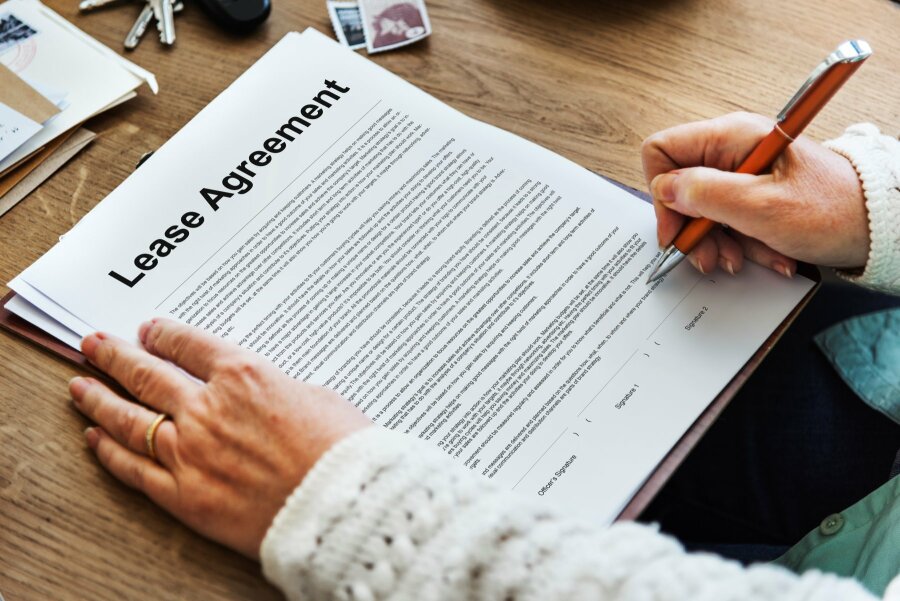The contents of this guide based on our knowledge and experience of the legal rental market in Thailand will explain the nuances of rental agreements in Thailand, taking into account both the laws that apply and the experience of seasoned expats and visitors. Whether you are a first-time renter in Thailand or an established expat, it is important to understand the need to have a rental agreement and know exactly what to put in it.
What is the Rental Law in Thailand?

Understanding the Legal Landscape of Rental Agreements
Before you rent a property in Thailand, it's crucial to familiarize yourself with the legal framework governing rental agreements in the country.
The Written Lease Agreement: A Non-Negotiable Requirement
First and foremost, grasp the importance of having a written lease agreement. In Thailand, this document serves as the cornerstone of your rental relationship. It's not just a formality but a legal necessity. Your lease agreement should leave no room for ambiguity, clearly articulating vital details such as:
- Lease Length: Specify the duration of your tenancy, including start and end dates.
- Rental Amount: Clearly state the monthly rent, any additional charges (e.g., maintenance fees), and the accepted payment methods.
- Security Deposit: Landlords may request a security deposit, usually equivalent to one or two months' rent. Understand the conditions for its return at the end of your lease.
- Rental Payments: Comprehend the schedule and method of rent payments. In Thailand, rent is typically paid monthly.
- Landlord and Tenant Rights: Familiarize yourself with the rights and responsibilities of both parties under Thai law.
- Termination Clause: The lease agreement should outline the conditions for terminating the lease, including notice periods and penalties for early termination.
- Property Inspection: Before moving in, inspect the property meticulously and document any existing damages or issues. This diligence will be your shield against disputes later on.
- Rental Agents: If you decide to enlist the services of rental agents, ensure they are reputable and licensed.
What is the Lease Agreement in Thailand?

Types of Rental Agreements in Thailand
In the Thai rental landscape, there are two primary types of rental agreements: short-term and long-term. Typically, rental agreements in Thailand are for a duration of one year, which can pose a significant hurdle for people just entering the country. Nevertheless, it is feasible to locate short-term leases as well. Apart from the standard one-year contracts (long term), certain accommodations provide rental options for periods as short as one, three, or six months (short term).
Regardless of the type, it's advisable to have a written rental agreement. Although not legally mandated for short-term leases, a written contract fosters clarity and can be invaluable in avoiding misunderstandings. Moreover, a Thai rental contract can be used as proof of address for matters such as long-term visas and for opening a Thai bank account.
Short-Term Rental Agreements
Typically spans up to six months, ideal for travelers and temporary stays. A short-term rental agreement, which governs the renting of property during this relatively short period of time, is a legally enforceable contract between a landlord (the property owner) and a tenant (the renter). These contracts are frequently used for short-term housing arrangements and differ from long-term leases in that they have shorter durations.
It is crucial to remember that under Thai law, owners of condominium apartments are not permitted to rent them out for periods shorter than 30 days unless they have a current hotel operating license.
Long Term Agreements
Extend for a year or more, offering stability for those planning an extended stay in Thailand. Unlike short-term rentals, which typically last for a few months, long-term rental agreements are generally intended for a year or more, often with the option to renew the lease at the end of the agreed-upon term.
Lease renewal in Thailand isn't automatic. Parties must take deliberate steps towards renewal, with periods extending up to 30 years. Success in renewal hinges on carefully drafted clauses outlining the intention to renew. Consulting with a lawyer for expert guidance in this matter is advisable.
Is Rental Agreement Registration a Legal Obligation in Thailand?
For leases exceeding three years, Thai law mandates the registration of rental contracts with the local land office. This ensures the enforceability of the agreement. So, if you're considering a long-term rental, be prepared to follow this legal protocol.
Key Components of a Thai Rental Agreement
Now that you understand the legal backdrop, let's delve into the essential elements of a robust Thai rental agreement:
- Identification of the Parties: Clearly identify both the landlord and tenant, including their full names, addresses, and contact information.
- Property Description: Provide a detailed description of the rental property, encompassing its address, type (e.g., condo, house), and any furnishings or appliances included.
- Rental Term: Specify the duration of the rental agreement, including start and end dates. Any options for renewal or extension should also be outlined.
- Rent Amount and Payment Terms: State the monthly rent, payment due dates, and any late fees or penalties for missed payments. Define accepted payment methods and detail any additional charges.
- Security Deposit: Articulate the amount of the security deposit, typically equivalent to one or two months' rent, and the terms for its return.
- Maintenance and Repairs: Clarify the responsibilities of both landlord and tenant for property maintenance and repairs.
- Rules and Regulations: Include specific rules governing the property, such as noise restrictions, pet policies, and common area usage guidelines.
- Termination and Notice: Define the conditions allowing either party to terminate the contract and specify the required notice period. Typically, a 30-day written notice is standard for both landlords and tenants.
It's essential to understand that while these elements form the core of a rental agreement, additional terms may be included based on specific circumstances.
What are the Tax Considerations for Rental Agreements in Thailand?
Thailand's rental landscape also has tax implications that you should be aware of:
Lease Registration Fee
Due to restrictions on property purchases by foreigners in Thailand, long-term leases are frequently the preferred option for foreigners looking to engage in business or rent properties like houses, villas, vacation homes, and more within the country.
For registered leases exceeding three years, a lease registration fee of 1% of the total rental throughout the lease term is applicable. This is required at the time of lease registration, the cost is typically borne by the tenant. Stamp duty is also collected at 0.1% based on the total rental throughout the lease term.
Income Tax
Any income earned from subleasing, renting out, or leasing the property is subject to personal income tax in Thailand. Property owners must declare this income and pay taxes accordingly. In most cases, rental income disbursed to non-tax resident foreign individuals in Thailand is subject to a 15% withholding tax; it is important to note that rental income is considered taxable income regardless of Thai tax residency.
Source: Thailand Revenue Department
When it comes to rental income in Thailand, the 15% withholding tax isn't the final word on your tax bill.
If you're a foreign property owner living outside Thailand and you've purchased the property under your own name, you could actually end up paying significantly less than the standard 15% tax rate. Here's how you can make it happen:
First, you must file a personal income tax return with the Thai Revenue Department, declaring your rental income. The withholding tax already deducted from your rent can be used as a tax credit to offset the tax you owe on your return.
By filing a tax return, you unlock the door to another potential benefit. You can request a refund of any surplus withholding tax credits directly from the Thai Revenue Department.
You can also claim actual expenses related to generating that rental income, provided you've got the necessary paperwork to back it up. Just keep in mind that those claimed expenses might undergo some scrutiny, and you'll need solid documentation to support your case.
The refund isn't handed out automatically. You've got to be proactive and specifically request that refund on your tax return. If you forget to do so there, you can still make the request within three years of the return filing deadline.
4 Tips for a Smooth Thailand Rental Agreement Experience
As you begin or continue on your Thai rental journey, consider these practical tips:
- Know Your Rights: To comprehend your responsibilities and rights as a renter, familiarize yourself with Thai rental laws and regulations. The purpose of rental legislation is to protect your rights as a renter. They spell forth your rights and the boundaries of your landlord's authority. By being aware of these rules, you may avoid any conflicts and guarantee that you are treated properly during your lease.
- Read the Agreement Carefully: Rental laws also spell out your responsibilities as a tenant. From paying rent on time to maintaining the property, understanding these obligations will help you stay on the right side of the law and maintain a good relationship with your landlord. Before signing, thoroughly read and comprehend the terms and conditions of the rental agreement. Seek assistance if needed.
- Negotiate Terms: Armed with knowledge, you can negotiate the terms of your lease more effectively. Whether it's discussing rent increases, security deposits, or repair responsibilities, being well-informed gives you the upper hand at the bargaining table. Don't hesitate to negotiate terms with your landlord.
- Legal Assistance: If navigating the legal intricacies feels overwhelming, consider consulting a Thai lawyer or legal professional experienced in rental law. They can guarantee your rights are upheld and offer vital assistance. Knowing the law gives you a strong foundation for initiating legal action in the unusual event that you have a disagreement with your landlord. It guarantees that you can act appropriately to safeguard your interests.
Frequently Asked Questions Regarding Rental Contracts in Thailand

Do I Need a Thai Version of My Rental Agreement?
You might be wondering if it's necessary to have your rental agreement written in Thai. Legally, there's no requirement for it to be in Thai, but it's a smart move to have both English and Thai versions. Why? It's all about ensuring crystal-clear communication and avoiding any misunderstandings between you and your landlord.
What is the Situation Regarding Subletting or Sharing?
Maybe you're thinking of subletting or sharing your rented property. It's a possibility, but-and this is crucial-it all hinges on what's stated in your rental agreement. Before you invite others in, always check with your landlord and give that agreement a thorough review.
Breaking Your Lease: How Does It Work?
You might find yourself needing to break your lease early. Once again, your rental agreement should spell out the rules for early termination. Generally, you might have to say goodbye to your security deposit or pay a penalty equivalent to a specific number of months' rent.
Rent Increases: Are They Allowed Mid-Lease?
The rent's gone up, and that may not be permitted during your lease term. It is another case where it’s important to check the details of your rental agreement. If the rental contract does not specify this, your landlord is not allowed to raise the rent without your agreement.
Dealing with Landlord Disputes
Sometimes, there may be landlord and tenant issues. Often the best approach is to start with open communication and try to resolve the matter amicably. If that doesn't cut it, consider enlisting some legal help to mediate the dispute or represent your interests in court.
In conclusion, before signing up for a rental agreement in Thailand, ensure you proceed with meticulous attention to detail. A well-structured rental contract not only safeguards your interests but also fosters a harmonious landlord-tenant relationship.
If you have any questions about Thai rental agreements, search for a Thailand real estate lawyer who can support your legal requirements.




